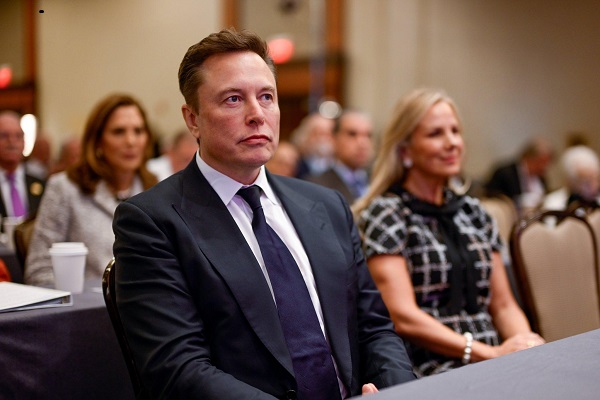Business
Elon Musk says X targeted by “massive cyberattack” originating in Ukraine

 MxM News
MxM News
Quick Hit:
Elon Musk revealed Monday that X was the target of a “massive cyberattack,” with IP addresses linked to the Ukraine region. Musk noted the attack was highly coordinated and suggested it could involve a large group or a nation-state.
Key Details:
-
Speaking to Fox Business’ Larry Kudlow, Musk said, “We’re not exactly sure what happened, but there was a massive cyberattack to try to bring down the ecosystem with IP addresses originating in the Ukraine area.”
-
Earlier Monday, Musk posted about the attack on X, stating, “There was (still is) a massive cyberattack against X,” adding that the platform faces daily attacks but this one was particularly well-resourced.
-
Musk, who acquired X (formerly Twitter) for $44 billion in October 2022, has faced increasing pressure as his companies, including Tesla and SpaceX, deal with coordinated protests that he alleges are backed by left-wing billionaires like George Soros and Reid Hoffman.
Diving Deeper:
X suffered a significant cyberattack Monday, according to its owner Elon Musk. During an interview with Fox Business’ Larry Kudlow, Musk said that while the full details were unclear, the attack sought to “bring down the ecosystem” and had origins tied to the Ukraine region. He suggested the attack was well-funded and likely involved either a large, coordinated group or a nation-state.
Musk had earlier addressed the incident on X, stating that while the platform regularly faces cyber threats, this particular attack was on a different scale. “We get attacked every day, but this was done with a lot of resources,” he wrote, adding that efforts were underway to trace those responsible.
The timing of the cyberattack raises questions, as it comes amid widespread protests against Musk’s other ventures, particularly Tesla. Musk has accused high-profile Democrat donors, including George Soros and LinkedIn co-founder Reid Hoffman, of financing the demonstrations. He has not provided direct evidence to support the claim, but the protests have coincided with an intensifying political battle over Musk’s influence in both the private sector and government.
Musk’s role in the Trump administration as the head of the Department of Government Efficiency has drawn praise from the president. Trump has credited Musk with spearheading efforts to reduce government waste and save taxpayers billions. Meanwhile, Musk’s companies, including SpaceX, hold lucrative contracts with the Department of Defense, making them frequent targets of scrutiny and opposition from political adversaries.
As X continues to investigate the cyberattack, the broader implications remain unclear. Whether a nation-state or an organized cybercriminal group was behind the attack could have significant ramifications, particularly given the geopolitical tensions surrounding Ukraine.
Business
Carney’s European pivot could quietly reshape Canada’s sovereignty

This article supplied by Troy Media.
Canadians must consider how closer EU ties could erode national control and economic sovereignty
As Prime Minister Mark Carney attempts to deepen Canada’s relationship with the European Union and other supranational institutions, Canadians should be asking a hard question: how much of our national independence are we prepared to give away? If you want a glimpse of what happens when a country loses control over its currency, trade and democratic accountability, you need only look to Bulgaria.
On June 8, 2025, thousands of Bulgarians took to the streets in front of the country’s National Bank. Their message was clear: they want to keep the lev and stop the forced adoption of the euro, scheduled for Jan. 1, 2026.
Bulgaria, a southeastern European country and EU member since 2007, is preparing to join the eurozone—a bloc of 20 countries that share the euro as a common currency. The move would bind Bulgaria to the economic decisions of the European Central Bank, replacing its national currency with one managed from Brussels and Frankfurt.
The protest movement is a vivid example of the tensions that arise when national identity collides with centralized policy-making. It was organized by Vazrazdane, a nationalist, eurosceptic political party that has gained support by opposing what it sees as the erosion of Bulgarian sovereignty through European integration. Similar demonstrations took place in cities across the country.
At the heart of the unrest is a call for democratic accountability. Vazrazdane leader Konstantin Kostadinov appealed directly to EU leaders, arguing that Bulgarians should not be forced into the eurozone without a public vote. He noted that in Italy, referendums on the euro were allowed with support from less than one per cent of citizens, while in Bulgaria, more than 10 per cent calling for a referendum have been ignored.
Protesters warned that abandoning the lev without a public vote would amount to a betrayal of democracy. “If there is no lev, there is no Bulgaria,” some chanted. For them, the lev is not just a currency: it is a symbol of national independence.
Their fears are not unfounded. Across the eurozone, several countries have experienced higher prices and reduced purchasing power after adopting the euro. The loss of domestic control over monetary policy has led to economic decisions being dictated from afar. Inflation, declining living standards and external dependency are real concerns.
Canada is not Bulgaria. But it is not immune to the same dynamics. Through trade agreements, regulatory convergence and global commitments, Canada has already surrendered meaningful control over its economy and borders. Canadians rarely debate these trade-offs publicly, and almost never vote on them directly.
Carney, a former central banker with deep ties to global finance, has made clear his intention to align more closely with the European Union on economic and security matters. While partnership is not inherently wrong, it must come with strong democratic oversight. Canadians should not allow fundamental shifts in sovereignty to be handed off quietly to international bodies or technocratic elites.
What’s happening in Bulgaria is not just about the euro—it’s about a people demanding the right to chart their own course. Canadians should take note. Sovereignty is not lost in one dramatic act. It erodes incrementally: through treaties we don’t read, agreements we don’t question, and decisions made without our consent.
If democracy and national control still matter to Canadians, they would do well to pay attention.
Isidoros Karderinis was born in Athens, Greece. He is a journalist, foreign press correspondent, economist, novelist and poet. He is accredited by the Greek Ministry of Foreign Affairs as a foreign press correspondent and has built a distinguished career in journalism and literature.
Troy Media empowers Canadian community news outlets by providing independent, insightful analysis and commentary. Our mission is to support local media in helping Canadians stay informed and engaged by delivering reliable content that strengthens community connections and deepens understanding across the country.
Business
EU investigates major pornographic site over failure to protect children

From LifeSiteNews
Pornhub has taken down 91% of its images and videos and a huge portion of the last 9% will be gone by June 30 because it never verified the age or consent of those in the videos.
Despite an aggressive PR operation to persuade lawmakers that they have reformed, Pornhub is having a very bad year.
On May 29, it was reported that the European Commission is investigating the pornography giant and three other sites for failing to verify the ages of users.
The investigation, which comes after a letter sent to the companies last June asking what measures they have taken to protect minors, is being carried out under the Digital Services Act. The DSA came into effect in November 2022 and directs platforms to ensure “appropriate and proportionate measures to ensure a high level of privacy, safety, and security of minors, on their service” and implement “targeted measures to protect the rights of the child, including age verification and parental control tools, tools aimed at helping minors signal abuse or obtain support, as appropriate.”
According to France24: “The commission, the EU’s tech regulator, accused the platforms of not having ‘appropriate; age verification tools to prevent children from being exposed to pornography. An AFP correspondent only had to click a button on Tuesday stating they were older than 18 without any further checks to gain access to each of the four platforms.”
Indeed, Pornhub’s alleged safety mechanisms are a sick joke, and Pornhub executives have often revealed the real reason behind their opposition to safeguards: It limits their traffic.
Meanwhile, Pornhub — and other sites owned by parent company Aylo — are blocking their content in France in response to a new age verification law that came into effect on June 7. Solomon Friedman, Aylo’s point man in the Pornhub propaganda war, stated that the French law was “potentially privacy infringing” and “dangerous,” earning a scathing rebuke from France’s deputy minister for digital technology Clara Chappaz.
“We’re not stigmatizing adults who want to consume this content, but we mustn’t do so at the expense of protecting our children,” she said, adding later, “Lying when one does not want to comply with the law and holding others hostage is unacceptable. If Aylo would rather leave France than apply our law, they are free to do so.” According to the French media regulator Arcom, 2.3 million French minors visit pornographic sites every month.
Incidentally, anti-Pornhub activist Laila Mickelwait reported another major breakthrough on June 7. “P*rnhub is deleting much of what’s left of the of the site by June 30,” she wrote on X. “Together we have collectively forced this sex trafficking and rape crime scene to take down 91% of the entire site, totaling 50+ million videos and images. Now a significant portion of the remaining 9% will be GONE this month in what will be the second biggest takedown of P*rnhub content since December 2020.”
“The reason for the mass deletion is that they never verified the age or consent of the individuals depicted in the images and videos, and therefore the site is still awash with real sexual crime,” she added. “Since the fight began in 2020, 91% of P*rnhub has been taken down — over 50 million images and videos. Now a huge portion of the last 9% will be gone by June 30 because P*rnhub never verified the age or consent of those in the videos and the site is a crime scene.”
Mickelwait has long called for the shutdown of Pornhub and the prosecution of those involved in its operation. This second mass deletion of content, as welcome as it is, reeks of a desperate attempt to eliminate the evidence of Pornhub’s crimes.
-

 Business1 day ago
Business1 day agoEU investigates major pornographic site over failure to protect children
-

 Health2 days ago
Health2 days agoRFK Jr. purges CDC vaccine panel, citing decades of ‘skewed science’
-

 Censorship Industrial Complex2 days ago
Censorship Industrial Complex2 days agoAlberta senator wants to revive lapsed Trudeau internet censorship bill
-

 Immigration2 days ago
Immigration2 days agoMass immigration can cause enormous shifts in local culture, national identity, and community cohesion
-

 Canadian Energy Centre1 day ago
Canadian Energy Centre1 day agoCross-Canada economic benefits of the proposed Northern Gateway Pipeline project
-

 Economy1 day ago
Economy1 day agoCarney’s Promise of Expediting Resource Projects Feels Like a Modern Version of the Wicked Stepmother from Disney’s Cinderella
-

 Alberta1 day ago
Alberta1 day agoAlbertans need clarity on prime minister’s incoherent energy policy
-

 Health2 days ago
Health2 days agoPolice are charging parents with felonies for not placing infants who died in sleep on their backs







